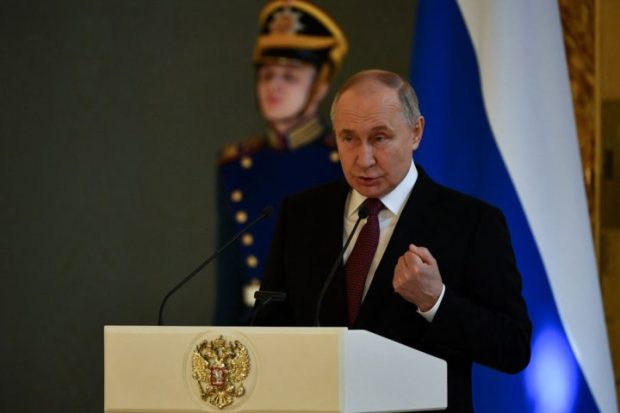Next week, voters will decide the future of the government, of Brexit, and perhaps of the Union. Jeremy Corbyn has been perfectly clear on what he offers: a radical experiment in far-left economics, going after the wealthy to fund the biggest expansion of government ever attempted in this country. Boris Johnson proposes to complete Brexit and restore much-needed stability to government. But given that about half of voters still oppose Brexit, the race is close. The prospect of Jeremy Corbyn in government – and all that this implies – is all too real. And it might become so if those who oppose him do not actively vote against him next week.
When the Chief Rabbi last week took the extraordinary step of urging voters to reject Corbyn’s government, it will have posed a dilemma to those on the left disgusted by the anti-Semitism that has bene left to fester in his Labour Party. Many might oppose Brexit. But would having Corbyn in No10 be a price worth paying for a second referendum? It’s either Corbyn – and the second referendum chaos he promises – or Boris Johnson, who seeks to pass the deal agreed with the EU and move on. He represents a Tory party that has hardly covered itself in glory over the three years, but he is the only alternative to a Corbyn government.
Corbyn will not bring closure on Brexit. Voters wouldn’t be asked to choose between the current Brexit deal and Remain in his new referendum. The choice would be between Remain and a new deal, yet to be negotiated, which would almost certainly be Remain in all but name. It would be a mockery of a choice and would ensure that the second referendum would inflict even more damage on our democratic fabric than the first. Additionally, after being promised a ‘once in a generation’ referendum in 2014, Scots would likely be subjected to another independence campaign — as the price for the SNP propping up a minority Labour government.
Yet these referendums would be minor headaches compared to the economic chaos. Under a Corbyn government we can expect a flight of capital caused by an attempt to bring back mass collective ownership and confiscation of private property in the form of nationalising 10 per cent of every company. If this comes about, it will be because not enough people took Labour seriously: they did not believe it would happen. The shocks of recent elections — the election of Donald Trump, the triumph of Brexit and populist victories across Europe – have shown that the unthinkable is happening on a fairly regular basis. Who is bold enough to argue that this pattern of a big election surprise is not going to be repeated this time?
Even if the Tories do get over the line on 12 December, they still have much to think about. Corbyn has managed to sell socialism to a new audience of young voters. Age, not social class, has become the main political divide in Britain. There are socioeconomic factors in his favour, most notably falling rates of home-ownership — a whole generation no longer has the stake in capitalism that its parents did. Corbyn’s spending plans, reckless as they are, do not seem so frightening to a generation which has never known interest rates much above zero. Debt, for now, has lost its bite. Younger voters, too, will be less shocked at the anti-Semetism crisis that has engulfed Labour.
Corbyn has got so far because he is a far better strategist than he is given credit for. He has been careful to phrase proposed rises in personal taxes in a way that does not sound extreme – his top rate of income tax, at 50 per cent, would be no higher than that which George Osborne imposed on taxpayers for several years, although it would kick in at a lower rate. (It is, though, hard to believe that spending the equivalent to another NHS every year could be funded simply by taxes on the richest 5 per cent and big business.)
The Tory campaign this time has been haunted by the spectre of 2017. One result of this has been a cautious manifesto, designed to avoid pratfalls rather than make an argument. There are hints in the document of the Britain that Boris Johnson wants to see, but not a full-blown prospectus. The Prime Minister has been cautious to the point of timidity, which does not suit him. He has, so far, been unimpressive. Which is disappointing, given how much there is at stake.
The Tories have also become too reliant on negative campaigning, and struggle to explain that their policies are delivering progressive reforms that always evaded Labour. From the record amount of tax collected from the richest to the highest employment rate ever: there is much to boast about. The international school league tables this week showed English schools soaring up global league tables – and doing so while money was tight. This is just the latest proof that schools are improved by reform – entrusting and empowering teachers – not stuffing more cash into a failed system.
Those who claimed that austerity would cripple Britain are today struggling to explain why employment is at a record high, household disposable income is at a record high and income inequality near a 30-year low. The usual trick is to point to food bank usage, without admitting that the Tories increased this vastly by integrating food banks into the welfare state. The IFS recently found that ‘severe forms of material deprivation have fallen by a fifth’ since David Cameron first came to power. This is the real story of the decade, which food bank statistics are used to conceal.
But if the Tories cannot tell their own story, then they will struggle. In the final few days of the campaign, three messages are needed. First, that to vote Labour means another year wasted, by having a second Brexit referendum and a second Scottish independence vote. Second, far-left economics cause damage: investors’ confidence can shatter, forcing up interest rates and leading to a budgetary crisis requiring emergency spending cuts. And finally, Boris Johnson should be clearer about his vision for Britain, about how he intends to boost the economy outside London and the south.
The sheer pace of political drama this year has left the country exasperated and exhausted. Many will be tempted to abstain, to hope that this muddle somehow resolves itself. But if Corbyn gets to power, it will be because so many of those appalled by him did not vote to stop him. Ian Austin, the Dudley North MP who quit Labour in disgust, puts it well: politics, he says, is all about difficult choices. As a lifelong Labour loyalist, he hates the idea of voting Tory – but now argues that doing so is the only logical consequence if you conclude, as he has, that Corbyn is unfit to lead Britain.
By the end of next week, either Jeremy Corbyn or Boris Johnson will be in No. 10. In this regard, the British voting system offers a crude, binary choice. Some may wish it were a different choice. But it’s the only one on offer next week. Never in our country’s modern history has it been more important to vote — and vote Conservative.
This is the leading article from the forthcoming issue of The Spectator, out tomorrow.
Got something to add? Join the discussion and comment below.
Get 10 issues for just $10
Subscribe to The Spectator Australia today for the next 10 magazine issues, plus full online access, for just $10.




















Comments
Don't miss out
Join the conversation with other Spectator Australia readers. Subscribe to leave a comment.
SUBSCRIBEAlready a subscriber? Log in